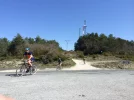It's similar to other publicized events - the recent Camino by the Sea project springs to mind - : the owners of the Compostela award system can hand them out as they see fit. Not to all and sundry but to the selected few who did not walk all of the last 100 km, did not have any need to make a secret out of it and were officially awarded their Compostelas.
I have been reading the whole thread in one go, partly amused, partly 'i'm not sure' what I think about the idea, and about the reactions. I think my thinking is somethling like this:
Its 6 days, each location will be impacted for 1 day (and maybe some preparation on either side), the numbers will be minimal (this year), and they will run about 12km per day. It actually doesn't sounds terribly interesting as an event to me. I think it is probably intended to grow legs and increase in numbers, and this year is like a test case, but I still don't see it as a huge deal, compared, as some people has posted, to the people who currently walk the Camino as a continuous party/drinking experience, etc.
However, since the office in Santiago makes such a big deal of its requirement to walk the last 100kms to qualify for a Compostella, this seems like they are willing to bend the rules in this case to such an extent that many feel they are breaking their own rule. That does feel like a big deal to me; if the intention is to give a Compostella as we would recognise it. If they will just get a certificate of race completion, then its less of a big deal. It seems that the participants will cover less than 100km over the 6 days, and that would concern me.
Someone at the start of the thread mentioned the Camino by Sea that was recently shown in documentary, as an example of the office making up rules and handing out Compostellas as they see fit; I there there is a profound difference. I watched the documentary, I walked with someone whose plan was to be in Santiago to meet the boat. This was 4 men who rowed a small traditional Irish boat from Ireland to near Santiago. It took them 6 weeks each year for 3 years. The blisters we get on our feet, they got on their hands. The spirit of pilgrimage was evident in them, in their oppenness to accept whatever hospitality they were given, and the personal challenges they experienced along the way. This was not a forerunner of a horde of boats descending from all over the world, but a personal journey. Its a bit hard to row into Santiago, so I guess there was some arrangement made with the pilgrim office. It does feel completely different from this though.
 .
.






















